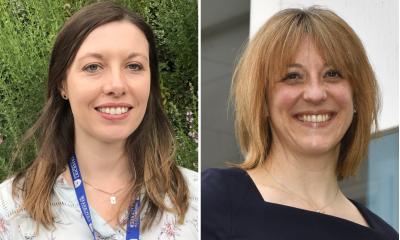Image source: Raul lucus from Pixabay (Background); Centers for Disease Control and Prevention (CDC)/Alissa Eckert, MS; Dan Higgins, MAM (Virus); Mashup: HiE/Behrends
Article • Post-hospitalisation
New study reveals impact of 'Long Covid'
A new insight into the longer-term impacts and recovery time for patients hospitalised with Covid-19 has been revealed in a UK-based study.
Report: Mark Nicholls
The Post-Hospitalisation Covid-19 study (PHOSP-COVID) found that seven in 10 patients have still not fully recovered five months after discharge and many face continuing impacts on their physical and mental health, and their ability to get back to work. It also highlighted that those who experience the most severe prolonged symptoms tend to be white women aged 40-60 with at least two long-term health conditions such as diabetes, lung or heart disease. Led by the National Institute for Health Research (NIHR) Leicester Biomedical Research Centre (a partnership between Leicester’s Hospitals, the University of Leicester and Loughborough University), the research also found that 20% of participants had a new disability, while cognitive impairment was also a predominant symptom in some patients.

Dr Rachael Evans, an associate professor at the University of Leicester and respiratory consultant at Leicester’s Hospitals, said: “Our results show a large burden of symptoms, mental and physical health problems and evidence of organ damage five months after discharge with Covid-19. It is also clear that those who required mechanical ventilation and were admitted to intensive care take longer to recover.”
The study analysed 1,077 Covid-19 patients who were discharged from hospital between March and November 2020. The most common symptoms were muscle pain, fatigue, physical slowing down, impaired sleep quality, joint pain or swelling, limb weakness, breathlessness, pain, short-term memory loss, and slowed thinking but many patients had several symptoms at the same time. The study also found a quarter of participants had anxiety and depression and 12% had symptoms of post-traumatic stress disorder after five months.
In addition, of the 67.5% of participants who were working before Covid, 17.8% were no longer working, and nearly a fifth experienced a health-related change in their occupational status. The study team underlined the need for employers to understand this and acknowledge Covid patients may take a long time to fully recover.
One of the most striking findings of the study is just how few people are fully recovered five months down the line
Rachael Evans
Dr Evans, the study’s lead co-investigator, said that much of the wide variety of persistent problems was not explained by the severity of the acute illness, indicating other underlying mechanisms “One of the most striking findings of the study is just how few people are fully recovered five months down the line,” she said. “This demonstrates how healthcare services will have to re-think strategies to deal with this post-Covid burden and how they will offer support to this group of patients. We have highlighted the need for a proactive approach. With both mental and physical impairments at five months, wider access to mental health and physical health interventions is required as well as a co-ordinated approach so patients are not seeing several different specialists.”
Dr Evans said health systems face a long-term legacy from Covid-19 and will need a range of strategies and interventions to cope with this.

The research has also uncovered a potential biological factor behind some post-Covid symptoms. A biological marker associated with inflammation, C-Reactive Protein (CRP), is elevated in all but the mildest of post-hospital cases.
Professor Louise Wain from the University of Leicester, and also a co-investigator for the PHOSP-COVID study, said: “From previous studies, it is known that systemic inflammation is associated with poor recovery from illnesses across the disease spectrum. We also know that autoimmunity, where the body has an immune response to its own healthy cells and organs, is more common in middle-aged women. This may explain why post-Covid syndrome seems to be more prevalent in this group, but further investigation is needed to fully understand the processes.”
Researchers classified the types of recovery into four different groups or ‘clusters’ based on the participants’ mental and physical health impairments. “The evidence for different recovery ‘clusters’, and ongoing inflammation, really is important in guiding how we conduct further research into the underlying biological mechanisms that drive ‘Long Covid’,” added Professor Wain.
The PHOSP-COVID study also measured the impact of medicines given during hospitalisation to see if they affect patients’ recovery. Early indicators show that while giving corticosteroids is a factor in reducing mortality in hospital, it does not appear to have an impact on longer term recovery.
There are more than 300,000 post-hospitalisation survivors that have been discharged from UK hospital’s following Covid-19 and while study only represents a small sample of these patients, it is the largest study to report in detail on prospectively assessed outcomes across multiple UK centres to describe the impact of Covid-19 on the medium-term health of survivors. The study will see participants followed-up at 12 months, as well as blood samples analysed, and ongoing effects on mental health and their immune systems assessed.
Profiles:
Dr Rachael Evans is an NIHR Clinical Scientist at the University of Leicester and an Honorary Consultant Respiratory Physician at Leicester’s Hospitals and a co-investigator of the study PHOSP-COVID. Her areas of expertise include exercise physiology, training and rehabilitation for people with long-term cardiorespiratory conditions.
Professor Louise Wain is the GSK/British Lung Foundation Chair in Respiratory Research in the Department of Health Sciences at the University of Leicester. As a genetic epidemiologist, her research is geared towards understanding the genetic factors that contribute to risk of developing respiratory disease.
01.04.2021








